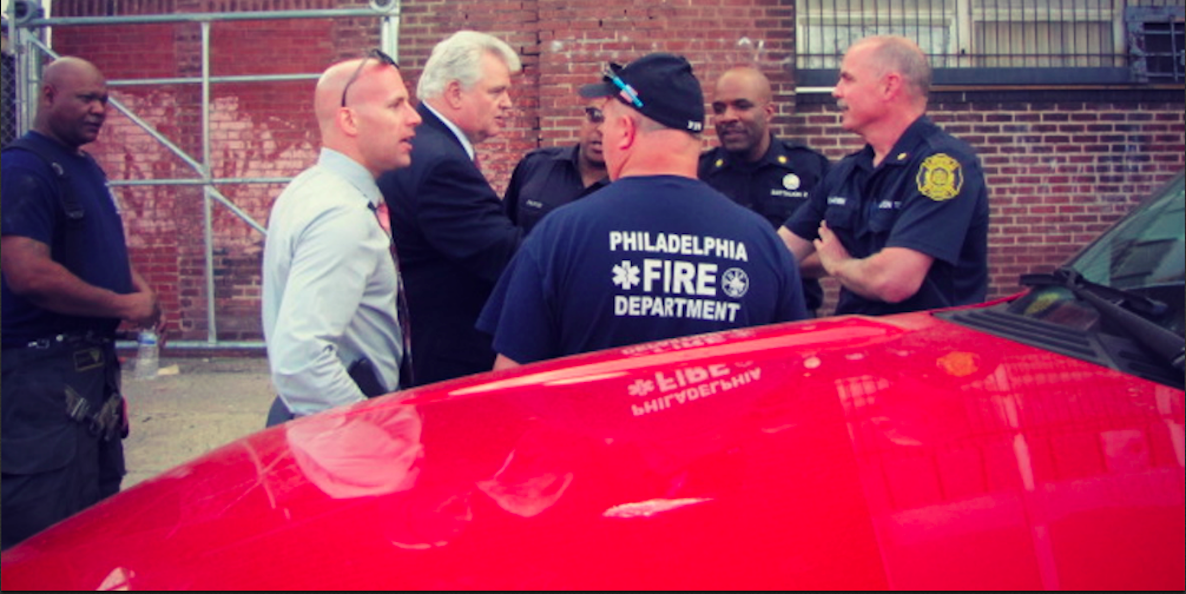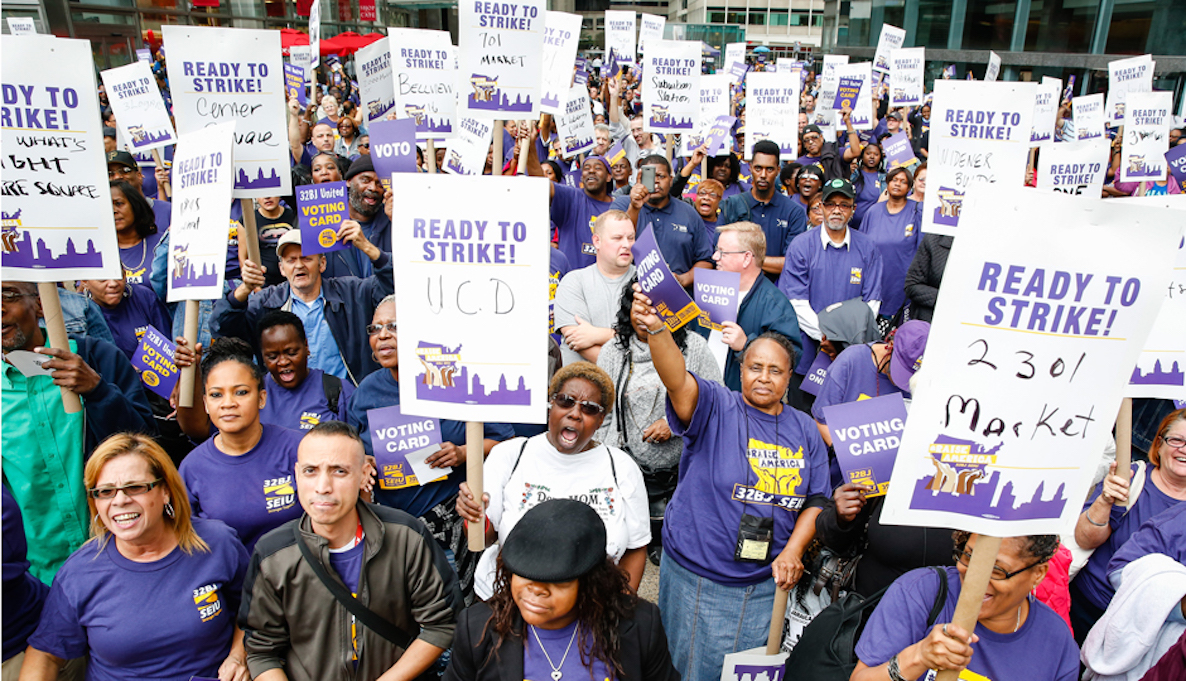Earlier this week, MSNBC’s Chris Hayes, who has become something of a bright, progressive spokesman for the Resistance, released his podcast interview with none other than our own District Attorney, Larry Krasner, who Hayes held up as a symbol of all that’s good and right in Trump’s America. It’s a fascinating interview, and Krasner proves again just how incisive is his mind.
Be Part of the Solution
Become a Citizen member.In introducing Krasner, Hayes positions his guest as the hero in “a kind of mythic story. The mythic story is a story about what happens when the revolution seizes the palace. What happens when the rebels take the capital, when they actually storm the halls of power and throw out the old regime, and sit in the throne room, and start making the rules.
Hayes is no doubt right; there is great drama in the story of a “lefty lawyer” who has spent his career suing the police and defending activists and criminals suddenly ascending to the position of the city’s top law enforcement official. That is dramatic. But something about it struck me as just a little too pat.
In reality, Hayes’ anointing of Krasner as the leader of a national movement raises questions about just what it means to be a progressive in Philadelphia—and what the costs are of living your values here. Krasner is only the latest such example in our midst. In case after case, trying to square national progressive values with local on-the-ground realities in Philly has become much more complicated than Chris Hayes—or anyone observing the city from the outside—would be in a position to know.
Can’t you just hear some retro white dude on Fox News saying, “In Philadelphia they lost $33 million because the female treasurer had to go out on maternity leave!” Is that really the opening a progressive officeholder wants to put out there?
For example, I’ve written ad nauseum that, yes, criminal justice reform is long overdue. Mandatory minimums, cash bail, a probation and parole system that actually feeds mass incarceration—all are ripe for urgent change. But to be a Krasner movement loyalist, do we have to countenance his dissing of the victims of crime? Do we have to nod our head in agreement when candidate Krasner calls the office he would lead “a coverup organization” and fires career prosecutors against whom he used to tussle in the courtroom? Do we have to be on board with reduced sentences for murderers that could find them back out on the streets in 15 years or less? In the Hayes interview, Krasner hints at some remorse at how he’s related to victims—as if they’re annoyances to be dealt with—and that’s a good thing. Maybe he can grow into the job.
![]()
But the job is not public defender in chief. Earlier this week, the murder rate exceeded that of a year ago. The clearance rate—the number of homicides we solve—is still among the nation’s lowest. The true progressive test for Larry Krasner really ought not to be how many violent offenders he lets out of prison. It ought to be: Did he help keep law-abiding citizens safe, particularly those in African-American communities, given that they’re disproportionately the victims of crime?
This conundrum—the perversion of progressive values—is not unique to the Krasner case. If you’re a progressive on national issues, you no doubt are a proud supporter of the American labor movement. As well you should be: Labor unions helped create a vibrant middle class and build a 20th Century economy that was the envy of the world.
In Philly in 2018, however, being pro-labor too often means turning a blind eye to thuggery and shady political dealings. When a video surfaced in 2016 of labor leader John Dougherty coming to blows with a nonunion worker on a city street, where were the progressive elected officials denouncing such behavior? Or how about when some goons from the Philadelphia Ironworkers Local 41 torched the Chestnut Hill Quaker Meeting House for using nonunion labor on the job? Yes, the perpetrators went to prison, but what did we hear from local liberals who, in other circumstances, are the first to express compassion for those who are bullied by the powerful? Crickets.
![]()
Those same progressives have targeted the city’s 10-year tax abatement on new construction as standing in the way of economic justice. But, as labor union PACs fill their campaign coffers, they conveniently gloss over the need for the tax abatement in the first place: The high cost of labor in the city of Philadelphia compared to the suburbs.
If you’re really a progressive, you have a reverence for good government. You pushed Nixon out of office. So why are you mum when progressive Mayor Kenney makes Dougherty’s chiropractor the head of the Zoning Board, a perfectly legal move, but one that undermines the public trust and values private interests over the common good. (Chiropractor James Moylan eventually stepped down from the Zoning Board, after his home and office were raided by FBI agents investigating Dougherty).
In the Hayes interview, Krasner hints at some remorse at how he’s related to victims—as if they’re annoyances to be dealt with—and that’s a good thing. Maybe he can grow into the job.
If you’re a progressive, you’re likely to consider yourself a feminist. But, in Philadelphia 2018, you just might come up against progressive Philadelphians unwittingly making sexist arguments to suit their political ends. That’s what happened a couple of months ago, when Councilwoman Blondell Reynolds Brown, in a speech on the Council floor, defended Treasurer Rasheia Johnson in the case of the missing millions.
In multiple hearings, Brown’s colleague, Councilman Allan Domb, had cross-examined both Finance Director Rob Dubow, a white man, and Johnson, an African-American woman. In a methodical, respectful way, Domb—looking out for the taxpayer—tried to get to the bottom of where the city’s mission $33 million might have gone, and how it was that up to seven city accounts, holding billions of dollars, had not been reconciled for years.
Brown did not attend—or, at least, did not ask any questions—at those hearings. (Nor did she respond to my two requests for an interview). But she rose in a subsequent Council meeting to defend Johnson:
“Today I rise to raise my voice as I will not allow any woman to be thrown the blame of years of mistakes, inefficiencies, mistakes [sic] or lack of oversight when she, an African American woman, has finally been given a seat at the table,” she said. “…There have been many criticisms of Ms. Johnson and most of them have come from white men.”
Chris Hayes’ anointing of Krasner as the leader of a national movement raises questions about just what it means to be a progressive in Philadelphia—and what the costs are of living your values here.
First, Domb hadn’t criticized Johnson. (I, however, did, calling in this space for the resignation of both Dubow and Johnson on grounds of simple accountability. Millions of dollars were missing and those in charge couldn’t answer questions about where it had gone.) Second, in her defense of Johnson, Brown stunningly advanced an argument that would make Betty Friedan gyrate in her grave:
“What so many people have failed to disclose is that, shortly after Johnson took her post as Treasurer in 2016, and after she discovered the lack of reconciliations, she left for leave—maternity leave, to take care of her newborn child,” she said. “Due to the fact that the city of Philadelphia did not implement the opportunity to work from home until January of 2018, just four months ago, Rasheia Johnson was not able to adequately address these issues and neither did anyone above her pay grade, despite knowing of the discoveries…This is yet another example of the disguised discrimination, mistreatment and lack of policies in place to assure the success of pregnant, professional women and other mothers across professions in our city.”
![]()
First, it’s worth noting that Johnson reacted to what should have been seen as a fiscal crisis by waiting some 16 months before taking action. Of the months she was on leave during that time, could it really be true that, in effect, all accounting stopped? The Philadelphia government—a $4.6 billion corporation—had no one else who could reconcile accounts?
But check out what Brown is up to here. Instead of trying to fix the systemic problem, what does she do? It’s called giving aid and comfort to sexists who are dying to argue that maternity leave is an undue burden on an organization’s bottom line. Can’t you just hear some retro white dude on Fox News saying, “In Philadelphia they lost $33 million because the female treasurer had to go out on maternity leave!” Is that really the opening a progressive officeholder wants to put out there?
If you’re a progressive of a certain age, you grew up seeing how—through programs like the GI Bill of Rights, Social Security or the Earned Income Tax Credit—governmental policies, competently administered, could lift people up and have real impact on real lives. In Philadelphia 2018, however, not only do no heads roll when $33 million goes missing from the public coffers; no new policy is offered to stem the tide of our three biggest challenges. We’re the highest-taxed big city in America this side of Bridgeport, Connecticut, we’re the nation’s most impoverished big city, and our 1.9 percent economic growth rate places us 23rd of the country’s 25 top cities.
It’s not hard to remember a time when progressives, called to lift up the least of us, would have innovative ideas for addressing such social ills. But, lately, being progressive in Philadelphia is, in itself, a complicated challenge.






